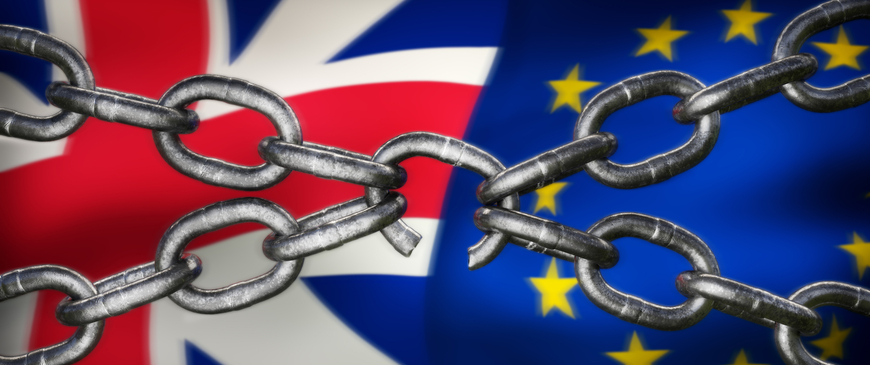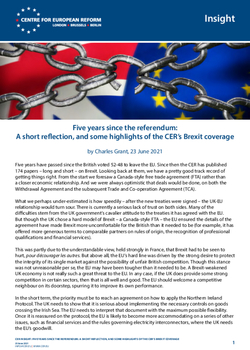
Five years since the referendum: A short reflection, and some highlights of the CER's Brexit coverage
Five years have passed since the British voted 52-48 to leave the EU. Since then the CER has published 174 papers – long and short – on Brexit. Looking back at them, we have a pretty good track record of getting things right. From the start we foresaw a Canada-style free trade agreement (FTA) rather than a closer economic relationship. And we were always optimistic that deals would be done, on both the Withdrawal Agreement and the subsequent Trade and Co-operation Agreement (TCA).
What we perhaps under-estimated is how speedily – after the new treaties were signed – the UK-EU relationship would turn sour. There is currently a serious lack of trust on both sides. Many of the difficulties stem from the UK government’s cavalier attitude to the treaties it has agreed with the EU. But though the UK chose a hard model of Brexit – a Canada-style FTA – the EU ensured the details of the agreement have made Brexit more uncomfortable for the British than it needed to be (for example, it has offered more generous terms to comparable partners on rules of origin, the recognition of professional qualifications and financial services).
This was partly due to the understandable view, held strongly in France, that Brexit had to be seen to hurt, pour décourager les autres. But above all, the EU’s hard line was driven by the strong desire to protect the integrity of its single market against the possibility of unfair British competition. Though this stance was not unreasonable per se, the EU may have been tougher than it needed to be. A Brexit-weakened UK economy is not really such a great threat to the EU. In any case, if the UK does provide some strong competition in certain sectors, then that is all well and good. The EU should welcome a competitive neighbour on its doorstep, spurring it to improve its own performance.
In the short term, the priority must be to reach an agreement on how to apply the Northern Ireland Protocol. The UK needs to show that it is serious about implementing the necessary controls on goods crossing the Irish Sea. The EU needs to interpret that document with the maximum possible flexibility. Once it is reassured on the protocol, the EU is likely to become more accommodating on a series of other issues, such as financial services and the rules governing electricity interconnectors, where the UK needs the EU’s goodwill.
In the long run we can hope for a closer UK-EU relationship. Future governments – whether Conservative or Labour – are unlikely to follow the extreme position of the current one, which unabashedly prioritises sovereignty over the economic benefits of retaining ties. Future governments are more likely to listen to the voice of business, and to consider the case for a close partnership with the EU on foreign and defence policy, so as to maximise Western unity in the face of hostile threats.
What follows are links to 20 of our more memorable publications – starting with some that came out just before the referendum of June 23rd 2016.
In 2014, our deputy director John Springford estimated that EU membership had raised the value of UK-EU goods trade by 55 per cent; that implied that Brexit would reduce Britain’s global exports and imports by 18 per cent. His doppelgänger estimates have subsequently shown that between the referendum and the exiting of the single market last December, UK goods trade fell by a tenth; and that since January 2021 the new trade barriers between Great Britain and its neighbours have cut trade by a further 11 per cent. So far, the much-maligned ‘gravity’ models that pointed to sizeable Brexit costs have turned out to be accurate.
In late May 2016, John Kerr, the CER’s chairman, wrote an insight which warned that Brexit would weaken the pillars of the UK's foreign policy, including its role as a link between the US and the EU. This correct prediction is evidenced in the UK’s current exclusion from EU-US dialogues that co-ordinate policy towards China and Russia.
In the same month I wrote an article for the CER bulletin on ‘Why Britain voted to leave the EU (if it does...)’, which correctly predicted the outcome of the referendum and the motivations behind it. In an insight published two months later, ‘Theresa May and her six-pack of difficult deals’, I forecast (rightly) that the UK would need to negotiate six separate sets of deals to achieve Brexit.
May’s government took a long time to work out what kind of Brexit deal it wanted, not invoking Article 50 until March 2017. At that time few people realised that the Withdrawal Agreement would have to include payments from the UK to the EU, to cover Britain’s share of future spending commitments, contingent liabilities and pension obligations. In his February policy brief, ‘The €60 billion Brexit bill: How to disentangle Britain from the EU budget’, FT journalist Alex Barker caused some consternation by revealing that the EU would ask for about €60 billion. In the end Britain agreed to pay €39 billion.
Christian Odendahl, our chief economist, and Sophia Besch, one of our senior research fellows, analysed Germany’s position on Brexit in a policy brief in March 2017. They were right that the view from Berlin would be largely focused on EU unity, since the EU’s success is a core German national interest rather than a transactional project. On the economic side, they also correctly predicted that Berlin would prioritise protecting the integrity of the single market, and its rules and its governability, over a trade deal with the UK.
In July 2017, our former research fellow Edward Burke wrote a policy brief pointing to the problems that would arise in Northern Ireland as a result of Theresa May's decision to leave the EU's single market and customs union. He also highlighted the Democratic Unionist Party’s concerns about Northern Ireland being treated separately from Great Britain.
I wrote an article for our bulletin in November 2017, setting out ten predictions for the Brexit negotiations. All of them turned out to be correct, with the partial exception of what I wrote about the Irish border. I was right that it would prove the most difficult issue to resolve – but I failed to foresee the border in the Irish Sea that the Northern Ireland Protocol has created (I could not imagine that a Conservative government would require the unionists to swallow such unpleasant medicine).
In March 2018, senior research fellow Sam Lowe wrote an insight about why an FTA would pose a new problem for companies trading between the EU and the UK: rules of origin. He predicted that exporters would be caught out by the new rules, and that some would struggle to comply. Sadly this has turned out to be the case. Two months later, in a bulletin article, Sam predicted that the EU would reject any UK request for mutual recognition in the financial services sector, and that if the UK intended to leave the EU’s single market, its financial services firms should prepare to trade with the EU on third-country terms.
In June 2018, Sophia joined Camino Mortera-Martínez, one of our senior research fellows, and Ian Bond, our director of foreign policy, in examining the prospects for post-Brexit security and defence co-operation between the UK and the EU. Their report forecast that in the Justice and Home Affairs negotiations, there would be three main priorities: access to databases, extradition and association agreements with agencies like Europol. They got it right that the first was going to be the hardest and the third the easiest; that the EU would not grant access to SIS II, its most important law enforcement database, and that access to others would depend on a data adequacy decision; and that Britain, excluded from the European Arrest Warrant, would have to put up with a Norway/Iceland-style surrender agreement.
Taking account of the UK’s and EU’s red lines, in December 2018 Sam predicted in a policy brief what an FTA would and would not deliver for trade in services. He explained that it would do little to facilitate cross-border trade in services, and that regulated UK services firms would need to set up offices in the EU if they wanted to continue selling to EU consumers on the same terms as now.
The Withdrawal Agreement, with its infamous Northern Ireland Protocol, was finalised in October 2019. The following month Sam looked ahead to the FTA that would be negotiated in 2020, in an insight. He described how the likely deal would affect businesses, pointing out that for many firms it would not be much better than no deal. He highlighted the huge problems that exporters of food, plants and animals would have – unless the UK signed up to EU rules on plant and animal health, which it has so far refused to do.
In March 2020, Sam sketched out a possible compromise between the EU and UK on the then-contentious issues of level playing field requirements for subsidies and rules on the labour market and the environment, as well as the structure of the agreement. Both sides ended up taking these recommendations on board nine months later.
In September 2020, our former research fellow Daniel Keohane wrote ‘A terrible border is reborn? Ireland and a no-deal Brexit’, an insight explaining why if the UK failed to implement the Northern Ireland Protocol, a land border on the island of Ireland would be required, and why that would be damaging to the peace process.
In a policy brief of November 2020, Ian considered the issue of foreign, security and defence co-operation between the UK and EU post-Brexit. He argued that the UK was under-estimating the value of a structured foreign policy relationship with the EU, while the EU was mishandling its foreign policy co-operation with like-minded countries, and not just the UK.
The Trade and Co-operation Agreement (TCA) was finally agreed at the end of 2020. Three months later Sam and Camino warned in a bulletin article that ‘Post-Brexit data transfers are not a done deal’. They wrote that despite the Commission granting the UK an adequacy decision, there were many problems ahead. Data privacy campaigners would try to have the decision struck down, because of what they perceive to be inadequacies in the UK’s data protection regime, for example in areas like national security.
A few days after the TCA was finalised, I had written an insight, ‘Ten reflections on a sovereignty-first Brexit’, which pointed out how strange it was that Boris Johnson’s government had paid relatively little attention to economics during the Brexit negotiations. It remains my view that in the long term the UK and the EU will forge a closer economic and security relationship, because it is in both their interests to do so.
You can find all of the Centre for European Reform’s research relating to Brexit here.
Charles Grant is director of the Centre for European Reform.


Add new comment